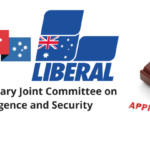The Bipartisan National Security Club Is Circling Independent Oversight Like a Vulture

The Parliamentary Joint Committee on Intelligence and Security (PJCIS) is an old major party politicians’ club that’s charged with scrutinising any national security legislation and rubber stamping it prior to handing it back to parliament to be enacted.
These are counterterror and surveillance laws, as well as those that serve to protect classified information, and tend to ride roughshod over the rights of citizens and residents. And the PJCIS now contains 12 major party members since a recent law change upped its numbers from 11 to 13.
Three bodies oversight our nation’s intelligence laws. Along with the major party PJCIS, there are two independent officers: the Inspector General of Intelligence and Security (IGIS) and the Independent National Security Monitor (INSM).
The nation’s national security framework is currently undergoing a restructuring. Today, ten agencies make up the National Intelligence Community (NIC). And one of those sits at the head, which is the Office of National Intelligence.
Indeed, the ONI has a managerial role in terms of the entire public sector.
And two national security bills recently before parliament have a focus on the IGIS. Both have been spruiked as mere tidying up legislation that seeks to modernise outdated drafting. But while that may be true regarding one of the bills, the other appears to be reigning in independent oversight.
A tightening of the screws
The Inspector General of Intelligence and Security and Other Legislation Amendment (Modernisation) Bill 2022 was passed on 6 September. This bill enhanced IGIS powers when dealing with ONI employees in line with the restructuring of the national security framework.
The IGIS is an independent statutory officer that now reviews the activities of six intelligence agencies.
The second yet-to-be-passed bill seeks to up this by four additional agencies: the Australian Criminal Intelligence Commission (ACIC), the Australian Federal Police (AFP), the Australian Transaction Reports and Analysis Centre (AUSTRAC) and the Department of Home Affairs.
These four agencies were incorporated into the NIC by the same 2018 legislation that created the ONI.
The restructuring of the NIC amendments within the ONI bill were influenced by the 2017 Independent Intelligence Review, which recommended strengthening integration across the NIC.
The other agencies making up the NIC are the Australian Geospatial-Intelligence Organisation (AGO), the Australian Secret Intelligence Service (ASIS), the Australian Security Intelligence Organisation (ASIO), the Australian Signals Directorate (ASD) and the Defence Intelligence Organisation (DIO).
The Intelligence Services Legislation Amendment Bill 2023 (the IS Amendment) broadens the scope of the IGIS so that the office bearer can monitor and consider complaints made about all ten agencies under the NIC umbrella.
Reining in independence
The explanatory memorandum relating to the IS Amendment states that the legislation will expand the jurisdiction of the PJCIS and the IGIS to cover all ten agencies making up the NIC, which is in line with the comprehensive recommendations of the 2017 independent review.
However, a further recommendation of that review has resulted in the drafting of a new power provided to the major party stacked PJCIS, giving it the authority to request an independent IGIS inquiry regarding intelligence activities, and if taken up, the inspector must report to the committee.
The bill “clarifies” that the PJCIS already has the power to require the Independent National Security Monitor to provide it with reports. The INSLM is an independent office bearer who reviews security and terror legislation. And in clarifying the PJCIS has this power, the bill creates a new law to do so.
The IS Amendment also clarifies that the IGIS does not have to inquire into an intelligence complaint that the office bearer considers “the action complained of is the kind of action that is reasonably likely to have been taken by an intelligence agency”.
These laws appear of concern as the exclusive major party committee notorious for rubber stamping all the 100-odd national security bills since 9/11, bar one, will now have the power to intrude upon independent intelligence oversight, and presumably curb any unnecessary inquiry from continuing.
Another dubious power that the IS Amendment is to bestow upon the PJCIS is the authority to review national security legislation of its own accord. And two scenarios could stem from this change.
The first is that the PJCIS may review sunsetting powers, which are those laws that due to their reach expire. Parliament can then debate whether to continue with such laws. However, the PJCIS could undertake its own review prior to debate and decide whether the majors will extend them.
Another issue could be that, if the IGIS or the INSLM alert the committee to intelligence practices that do happen to be in breach of the law prior to any public knowledge of this, legislation could be reviewed, and a subsequent amendment could right the outstanding illegality.
Claws out
There are clear reasons why those behind the tightening and the restructuring of the national security apparatus would want to draw in independent oversight reviews that stray from their ultimate goal of shutting down open government and replacing it with secret backdoor deals.
Former ASIS agent Witness K went to the IGIS to complain about a work issue that involved the 2004 illegal bugging of the Timor-Leste cabinet office, which served to give the Howard government the upper hand in oil and gas treaty negotiations. These deals ultimately benefited corporations.
The inspector advised K to consult with ACT barrister Bernard Collaery. And the unlawful surveillance operation was exposed publicly, the nation’s reputation was stained internationally, and millions were spent on prosecuting the two men.
But if the PJCIS was aware of what was going on, it might have been able to head it off at the pass.
In terms of ensuring the INSLM doesn’t overstep the mark in what kind of information the office bearer exposes, the independent reviewer undertook a comprehensive review of the Witness J trial: the most secretive trial ever to take place in Australia that’s been exposed.
And there’s another stark reason why the independence of the IGIS would be causing Canberra a headache right now, and that’s because the inspector has agreed to inquire into the attempted extradition of Australian citizen Dan Duggan to the United States.
The inspector is probing into whether ASIO, in breach of local laws, lured Duggan back to Australia with the promise of a pilot’s licence, so AFP officers could take him into custody on behalf of the White House.
Duggan’s case, which has seen him kept in prolonged solitary confinement since last October, is problematic as Washington seems to want to prosecute the ex-US marine pilot over having legally taught Chinese nationals how to fly in order to use him as a political pawn in the lead up to war.







